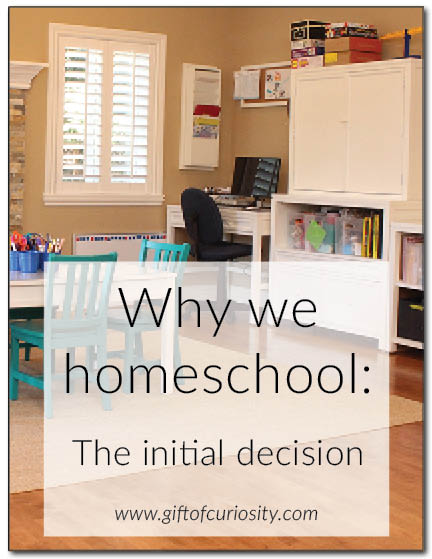This post may contain affiliate ads at no cost to you. See my disclosures for more information.
To a certain extent, I believe all parents are homeschoolers because parents are their children’s first and most important teachers. Even parents who send their kids to traditional schools are still responsible for teaching their kids so many things, including manners, social skills, ethics, emotional regulation, and much more.
We have a been a homeschooling family ever since we adopted our first child. My son was 18 months when he joined our family in 2010, and my daughter was 32 months when she joined our family in 2012. Both of my kids had many developmental delays when they joined our family, and I took it upon myself to provide them with the most enriching environment I could in order to support their healthy development. I used to call this our “homeschool preschool.”
Although I was in grad school part time when we adopted our children, the hours I was not doing schoolwork were spent engaging them in developmentally appropriate learning experiences. We did process oriented art projects, we engaged in sensory play, we listened to music and danced together, we worked on fine motor skills, we worked on language development, and so much more. (I’m pleased to say that both my kids have made tremendous progress and neither of them would be considered “delayed” anymore.)
In 2013 I finished my Ph.D., but I did not look for a job at the time. Instead, my husband and I spent a lot of time that year looking at schooling options in our community, including the local public school, magnet schools within our district, and several private schools. We also considered homeschooling.
Eventually, after much reflection, we opted to give homeschooling a try when my kids entered school in the fall of 2014.
There was no one reason why we opted for homeschooling. Instead, it was the confluence of a number of factors that lead us to decide that homeschooling was the right choice for our family. In this post I’m sharing the top four reasons that initially led us to give homeschooling a try when we made the decision two years ago.

#1: I thought I would enjoy it.
Probably the biggest reason why I began homeschooling – and why I continue homeschooling today – is that I thought I would enjoy it.
I’ve always liked working with kids, and my professional career was in the educational space. I loved creating curriculum when I was doing educational work professionally, and I looked forward to the opportunity to put together curriculum to use with my kids.
I also enjoy my kids and wanted the opportunity to spend more quality time with them. I wanted to create a family that learns and grows and thrives together, and I thought homeschooling would give us the best opportunity to do that.
#2: I didn’t feel there was any one school that was well suited to meet the educational needs of both of my kids, who had very different learning needs.
My son is extremely bright and he notices everything around him. He is the kind of kid who only has to hear something once to learn it. He has a memory like a steel trap. I was afraid he would be bored in a regular classroom where things would move at a slower pace than he would prefer. And if that happened, I was afraid of what it would do for his motivation and his behavior. I felt that homeschooling would allow him to go at a pace that would keep him engaged.
My daughter, at the time, was still really struggling with some brain integration issues that we now know stem from the neglect she experienced before we adopted her as well as from the tremendous load of heavy metals she carries in her body (and that was are working very hard to detox). Thankfully her learning ability is much improved now, but at the time she had a lot of learning challenges that I knew would put her behind from day one in a traditional classroom. I was afraid she would be negatively labeled for things beyond her control, and that this would affect her self-esteem. I felt she would do much better with one-on-one interaction with me where I could very closely monitor her learning and adapt my teaching to her needs.
#3: I wasn’t convinced that school would be the appropriate place for my kids to get their emotional needs met.
My kids have unique emotional needs that stem, in part, from the fact that they were both adopted as toddlers. Their early experiences and the multiple losses they have experienced have shaped the way they interact with my husband and myself. At the time we were making initial decisions about schooling, my kids both needed the security of being at home more than would have been possible if they attended a traditional school for 30 hours a week.
#4: We wanted the freedom to travel on our own schedule rather than the school’s schedule.
My husband is very fortunate to enjoy a six-week sabbatical from work every five years. That sabbatical coincided with my kids’ first year in school. Our family wanted to take advantage of my husband’s long break to enjoy a four-week RV trip across several states. Choosing homeschooling allowed us to take the trip during the spring when the prices were lower, the temperatures were cooler, and the crowds were smaller. (We had a blast on our RV trip, by the way, which you can read a bit about in this post.)
Homeschooling has also given us the opportunity to take a number of other shorter trips to visit friends, family, and fun new spots where our family could have fun and learn together.
While we may not engage in a lot of traditional school-like learning when we are on vacation, the trips we have taken have provided some of the richest educational opportunities for our entire family – kids and grownups alike!
More homeschooling resources
More homeschooling posts from Gift of Curiosity:




I completely understand how you came to the conclusion that homeschool was best. I am curious, though, about the development in the social-emotional area. Parents should be modeling manners and things like sharing, no question. However, shouldn’t the point be that the children then have the chance to use them and improve them everywhere? Your reasons for home schooling are very similar to those I’ve heard from friends through the years — and like them, you don’t speak to the issue of having to build friendships and relationships with peers. It’s all about their individual needs or the flexible schedule. All well and good, but what troubles me about some of the home schooling I’ve seen is that it seems to become very insular. Home and family have a very different dynamic than play groups, preschools, etc. I often wonder how socially competent those home schooled children really are outside the family circle. I’m the oldest of five — manners, sharing, and getting along were insisted on in our house. (I should add that we were all born within six years, life would have been quite chaotic if my parents hadn’t emphasize rules and boundaries!) When we all went to school, though, we all had to build on those sharing/getting along skills in our interactions with people who didn’t live with us and intuitively understand us. Our parents also had us participate in things like scouting and sports as well. Through our interactions with others that were not family, we learned things about negotiating, problem solving and understanding differences. I’m convinced that we became better people for it, although that is just my opinion. However, it’s clear from a robust body of research that solid social emotional skills are essential for adult success. My understanding of the research is that peer interactions are actually critical in social-emotional development. So, my question, after this long comment, is: how do you address the need for peer interactions and further social development? Are your children in play groups or sports activities, Scouts or Campfire Girls? If not, I would love to know your reasons, but I understand if you feel they are personal. If so, I would love to see you encourage that! I respect families who wish to educate their children at home. As a teacher in the ECE field for the last 27 years, I also know that is important for those same children to learn how to function in the world outside of their family.
Hi Karen –
Thank you for your question. Your comment echoes a common concern/question that people (who usually have little experience with homeschooling) have about homeschooling – what about socialization? Of course, as you point out, socialization is important. And homeschooling, at least for the families I know, involves LOTS of socialization. What I love about the socialization my kids get, however, is that it is not just limited to kids in their same grade. My kids socialize with kids of all ages, and with adults in our community as well.
I can tell you that one thing I have enjoyed most about our homeschooling is getting together with other families. We are part of a group in which kids from kindergarten through eighth grade get together to do crafts and other learning activities, and they all play together. The older kids are great with the younger kids, and the younger kids really look up to the older kids. I value the opportunity for my kids to have rich social experiences with people of all ages. I also value the fact that myself and other parents are there to guide the kids as they work on their social skills when they struggle with things like including others or negotiating conflict respectfully.
So yes, my kids get to spend time with other kids on a regular basis. They attend classes at our local homeschool co-op one full day a week where they have friends and get to play with them during lunch and recess. They see friends from our home studies program regularly – at least once or twice a month. They play sports. I teach classes for homeschoolers in my home, so we have kids over one afternoon a week. They have (non-homeschool) friends in the neighborhood that they play with once or twice a week after school. We go on field trips with other homeschooling families. We go to the library and attend programs there. They attend camps during the summer. They have been involved with musical theater. They have taken music classes. In sum, I most certainly do not keep my kids locked up at home and away from other people all day long. 🙂
I want my kids to be prepared to interact positively and respectfully with people of all ages and backgrounds. Of course it’s a work in progress, as my kids are still young. But that is a goal I have for them, and so far I think we are doing pretty well. 🙂